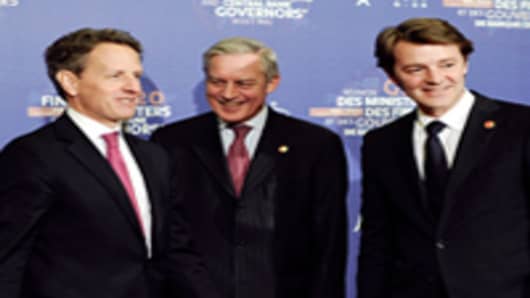PARIS—While finance ministers and central bankers here at the G20 meeting desperately seek a comprehensive solution to Europe's debt crisis, a separate debate has broken out over the role of the International Monetary Fund in any rescue package.
The ideas being circulated range from giving the IMF more money to play a central role in a European bailout to allowing only a small adjustment of the Fund’s toolbox to let it use its existing funds more rapidly.
People familiar with the talks said the discussions were in an early stage and that some combination of a bit more money and changes to the IMF’s lending rules could be agreed upon.
But even the discussion of a greater IMF role was creating political rancor. Several leading G20 members, including the U.S. and Japan, want to ensure that any European bailout maximizes the use of funds from the continent. It’s feared that committing IMF funds before the Europeans have said what they will contribute could let them off the hook.
In a CNBC interview, U.S. Treasury Secretary Tim Geithner insisted that Europe has substantial resources to solve its own problems. He said the U.S. would consider using IMF funds, but he opposed for now giving the IMF more money.
“The IMF has very, very substantial uncommitted resources,” Geithner said.
Geithner was clear that using IMF funds, which are backed up in part by US taxpayers, made sense.
The U.S. “never lost a penny on any of our exposure to the IMF,’’ Geithner said. “And that's because, of course, IMF resources come with very strong conditions and are deployed prudently to help in crises like they've been.”
He added: “You're seeing the IMF do extraordinarily productive things over time. That's made the U.S. economy stronger, not weaker…we'll continue to look for ways we can help Europe” through the IMF.
Geithner was careful not to rule out additional IMF funds, but he made clear he wanted to see substantial European commitments first. The Obama administration knows even using existing IMF resources to help Europe is controversial domestically; committing more money could cause a political backlash.
In 2009 and 2010, the IMF members agreed to commit $380 billion to a Precautionary Lending Facility that could be tapped by members with generally sound economic fundamentals but that faced funding pressure in the market.
The key question for Europe is what it does with the 440 billion euro European Financial Stability Facility .
Most observers agree it’s a small amount of money if the debt crises explodes in Italy or Spain. So current discussions involved possibly levering up the EFSF, with some officials looking for Europe to borrow 3 to 5 euros for every euro in the fund and using the leverage money to buy bonds in the secondary market. But there is reluctance in Europe to lever the funds.
A leading idea under discussion would employ the EFSF to guarantee new bond issues by member states. Another idea would use the EFSF to fund an interest rate cap scheme, where countries could draw on funds when they issue bonds at rates above a certain level.
The main source of optimism here is the recognition by Europe that a more substantial series of actions and pool of money are needed than what so far has been committed.
Several ministers said they planned to use the G20 meetings to pressure Europe to come up with a large plan quickly. But agreement is not expected here in Paris. Officials here cautioned that the earliest a plan would be agreed is an Oct. 23 meeting of European finance ministers.
But wrapping the IMF into the equation, which is likely in some form, could mean that a final plan is not agreed on until the meeting of G20 leaders in Cannes, France, Nov. 3 and 4.



